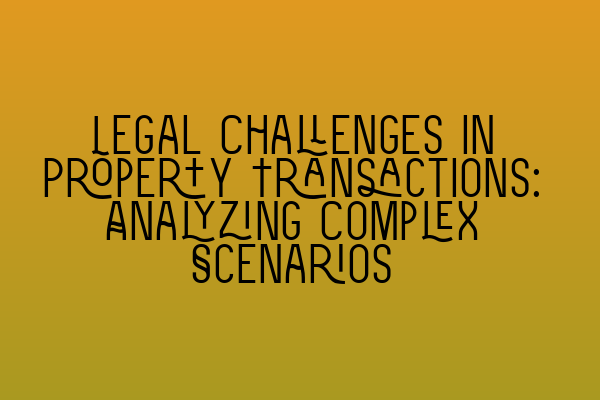Legal Challenges in Property Transactions: Analyzing Complex Scenarios
Property transactions can be complex and challenging, requiring a thorough understanding of property law and land law. Whether you are buying or selling a property, engaging in a lease agreement, or refinancing your existing property, it is crucial to navigate potential legal challenges effectively. In this blog post, we will analyze complex scenarios that often arise in property transactions and provide expert insights on how to overcome them.
1. Legal Due Diligence
Before entering into any property transaction, it is essential to conduct a comprehensive legal due diligence process. This involves thoroughly examining the property’s title deeds, leases, and any restrictions or encumbrances that may affect its use or value. Additionally, it is crucial to review planning permissions and zoning regulations to ensure compliance with local laws. Failure to conduct proper due diligence can lead to future legal disputes and financial losses.
To gain a deeper understanding of legal due diligence in property transactions, you may find our related article on Contract Law Reforms: An Analysis of Recent Changes helpful. It explores recent changes in contract law that may impact property transactions and provides valuable insights on ensuring compliance.
2. Contracts and Agreements
Once the due diligence process is complete, the next step is drafting and reviewing contracts and agreements. In property transactions, contracts play a vital role in clearly defining the rights and obligations of the parties involved. This includes outlining the purchase or lease terms, payment schedules, property condition warranties, and any additional clauses that protect the interests of the parties.
If you want to test your knowledge of contract law, we recommend trying our Interactive SQE Mock Tests for Contract Law: Test Your Knowledge. It is an excellent resource to assess your understanding of contract law principles and concepts relevant to property transactions.
3. Financing and Mortgages
Financing a property transaction often involves obtaining a mortgage or loan from a financial institution. However, complex legal challenges can arise when dealing with mortgage agreements. It is crucial to understand the terms and conditions of the mortgage, including interest rates, repayment schedules, and potential penalties. Additionally, ensuring compliance with all legal requirements and regulations is essential to avoid complications in the future.
For expert insights and guidance on SQE contract law principles related to property financing, you may want to join our SQE contract law webinars. Our webinars aim to provide comprehensive guidance and practical tips on navigating complex legal scenarios in property transactions. Learn more by visiting Join Our SQE Contract Law Webinars: Expert Insights and Guidance.
4. Landlord-Tenant Disputes
In property transactions involving lease agreements, disputes between landlords and tenants can often arise. These may include conflicts regarding rent payments, property maintenance responsibilities, lease renewals, or eviction procedures. Resolving such disputes requires a thorough understanding of both property law and landlord-tenant laws, as well as effective negotiation and dispute resolution skills.
For a detailed analysis of the rights and responsibilities of parties in a contract, including lease agreements, you may find our related article on Parties in a Contract: Rights and Responsibilities beneficial. It provides a comprehensive guide to understanding the various obligations and entitlements of landlords and tenants in contractual relationships.
5. Legal Compliance and Ethical Considerations
In any property transaction, it is vital to prioritize legal compliance and ethical considerations. This includes ensuring compliance with all relevant laws, regulations, and industry standards. Ethical considerations, such as disclosing material information and acting in the best interests of the client, are equally essential in maintaining a professional and trustworthy relationship with all parties involved in the transaction.
For a comprehensive guide on the importance of ethics in contract law, we recommend reading our related article on The Importance of Ethics in Contract Law: A Comprehensive Guide. It explores the ethical dimensions of contract law and provides valuable insights on navigating ethical challenges that may arise in property transactions.
In Conclusion
Property transactions present unique legal challenges that require a deep understanding of property law and land law. By conducting thorough legal due diligence, drafting solid contracts and agreements, navigating financing and mortgages diligently, resolving landlord-tenant disputes effectively, and prioritizing legal compliance and ethical considerations, you can overcome these challenges and ensure a successful property transaction.
To further enhance your knowledge of contract law and gain practical insights from experts, consider participating in our SQE contract law webinars or testing your understanding with our interactive SQE mock tests. By staying informed and well-prepared, you can navigate complex property transaction scenarios with confidence and achieve the desired outcomes.
